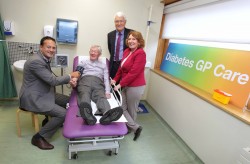 Next major step in Govt plans for universal healthcare Diabetes Cycle of Care service starts this Thursday
Next major step in Govt plans for universal healthcare Diabetes Cycle of Care service starts this Thursday
Minister for Health Leo Varadkar and Minister for Primary Care, Social Care & Mental Health Kathleen Lynch have officially launched the new Diabetes Cycle of Care service for holders of medical cards and GP Visit Cards who have Type 2 Diabetes.
Coming into effect from Thursday 1st of October the service allows qualifying adult patients with Type 2 Diabetes to have their condition reviewed thoroughly twice a year. It’s estimated that around 70,000 patients with Type 2 Diabetes will be eligible.
In announcing the new service, Minister Varadkar said: “This is a major step forward in expanding the scope of general practice into Chronic Disease Management. It allows patients with Type 2 Diabetes to be managed in the community, by their own GP and practice nurse they know, rather than in a hospital clinic where they might have to queue for hours to see a different doctor each time. This is better for patients and it also frees up hospital resources for more complex cases. I hope that the Diabetes Cycle of Care service will be used as a model for more chronic diseases to be looked after in the community, including COPD, asthma and heart failure.”
Minister Lynch added: “Through the Diabetes Cycle of Care we are encouraging and facilitating people to play a greater role in managing their illness. The programme provides Medical Card and GP Visit Card holders with Type 2 Diabetes with two dedicated GP visits a year to specifically monitor their condition. This should contribute to better health and as a result reduce the need for hospital visits and admissions.”
As part of this new Cycle of Care, qualifying patients will have two annual visits to their GP for a structured review of their condition. This will include a review and recording of blood results since registration, a review of their medication and lifestyle factors, a symptomatic foot review, continuing participation in the eye prevention programme and onward referral if appropriate, assessment of blood pressure, BMI, and further education about their diabetes.
Welcoming the announcement today, Professor Hilary Hoey, Chairperson, Diabetes Ireland said: “Diabetes Ireland is delighted to see this initiative launched. The ability to have two diabetes management reviews each year will no doubt help detect any related health issues much sooner enabling earlier intervention thus improving quality of care for the individual. We see the Cycle of Care as a first step in the provision of a structured diabetes service that must be extended to all people with Type 2 diabetes as soon as possible”.
John Hennessy, National Director of the HSE Primary Care Division, welcomed the commencement of this new service. He said: “The rollout of this Cycle of Care for adult patients with Type 2 Diabetes is the first step towards extending programmes of care for the management of chronic diseases in primary care. 31,000 patients are already registered by 900 GPs for this new service and I would like to encourage GPs to continue to register their patients as soon as they can.”
It is expected that the number of people with diabetes will increase by a further 60% over the next 10 to 15 years, a reflection of a number of factors including changed lifestyle pattern, increased weight gain, sedentary lifestyle and increased life expectancy within the population. Therefore, in addition to being an important public health issue, diabetes care consumes up to 10% of the Irish healthcare budget.
The Diabetes Cycle of Care service is a key step in the Government’s plans for universal healthcare. It should improve clinical outcomes for patients and reduce the sort of complications that are often experienced with Type 2 Diabetes. The service has the potential to provide a better quality of life, improved health and wellbeing, and fewer visits to hospital.
Ends
Further information
The service is provided by participating GMS contract holders and allows qualifying patients, who have been registered by their GPs, to have two annual structured reviews of their condition. GPs will be required to submit an agreed dataset to the HSE when registering each patient and an annual data return in accordance with an agreed minimum dataset.
The first part of the Government’s plans for universal healthcare started earlier this year with the launch of free GP care for under sixes and over 70s. The Department of Health then opened talks with the IMO and the HSE to review the GMS contract and other publicly funded health sector contracts with GPs, with a particular focus on Chronic Healthcare Management. This has already led to agreement on the introduction of the Diabetes GP Care service.

